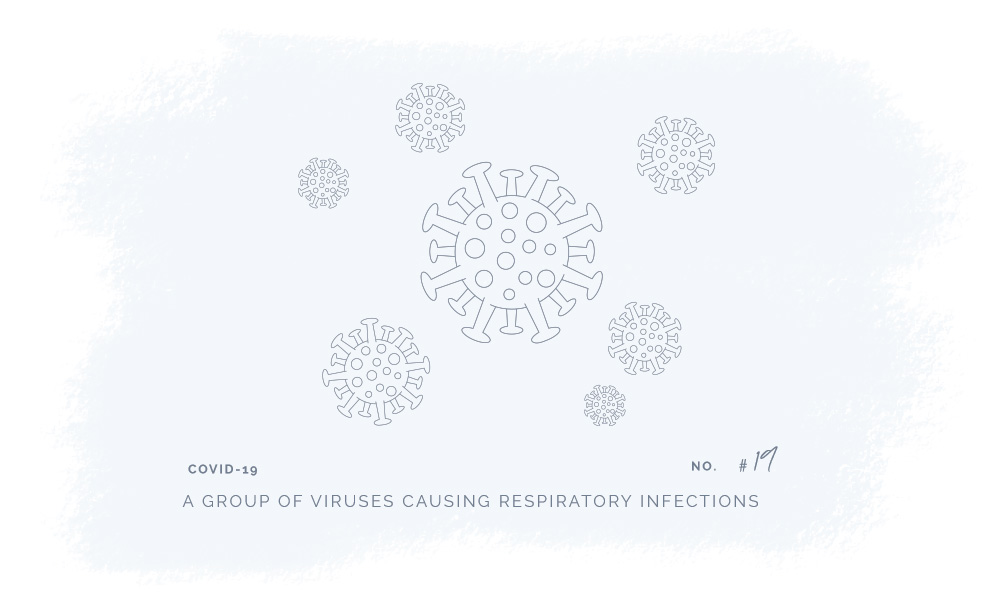COVID-19
Category
Infectious
REVIEWED BY
Our Biomedical Scientist
Reviewed based on
Literature Discussion & Clinical Trials
Last update
September 2020

What is COVID-19
Coronaviruses are a group of viruses that can lead to disease in animals or humans. It is known that respiratory infections ranging from the common cold to more severe diseases such as Middle East Respiratory Syndrome (MERS) and Severe Acute Respiratory Syndrome (SARS) can be caused by several coronaviruses in humans.1
History
The coronavirus disease 2019 (COVID-19) is an infectious spreading disease originating from Wuhan, China in December 2019 which is currently having a huge impact on health and economy worldwide.2,3 The pathogen of the disease, SARS coronavirus 2 virus (SARS-CoV-2), is a newly discovered coronavirus strain that can make people sick and cause various symptoms in the body.
Symptoms
People may experience symptoms such as fever, dry cough, tiredness, and some people may possess different symptoms, including aches and pains, nasal congestion, runny nose, sore throat, diarrhea, headache, loss of smell and taste, and shortness of breath. Usually, these symptoms are not severe, and people develop them gradually, whereas it is possible that some individuals get the disease without showing any symptoms. Most patients (about 80%) beat the disease without any special treatment. Difficulty in breathing and the risk of getting seriously sick was shown in around one out of every six people. Older people and those who have other diseases are at higher risk to become more ill compared to people without any underlying medical conditions.1,2
Cause
People can get infected with the virus if they are in contact with already infected people. The disease can be transmitted to another healthy person through small droplets from the nose or mouth of an infected person who is coughing or exhaling. It is also possible that infectious diseases can be transmitted by touching various surfaces and objects. Then the virus enters the body and reaches the cells which can lead to the infection.1,2
The connection between Cannabinoids & COVID-19
Studies find that CBD and THC may have great therapeutic potential and may be used to help treat COVID-19. CBD and THC are well-known cannabinoids, however, they do not have the same psychoactive effects. THC is psychoactive while CBD does not possess psychoactive effects. According to WHO guidelines, the cannabidiol CBD is generally well tolerated with a good safety profile.
To this date, it is not known whether cannabinoids such as CBD and THC have therapeutic potential in the case of COVID-19. It is advised to be cautious when using cannabis compounds when suffering from COVID-19, and only do so after consulting your doctor.2
The literature discussion is an overview of the published results from scientific studies investigating if and how cannabinoids can be beneficial in the treatment of COVID-19. The overview will be updated regularly to ensure the newest and most accurate information.
CBD may play a role in anti-inflammatory activities
Angiotensin-converting enzyme II (ACE2) is important for mediating SARS-CoV-2 entry into the body. Disease susceptibility may possibly be reduced via modulation of ACE2 receptor expression in lung tissue, oral and nasal mucosa, kidney, testes, and the gastrointestinal tract. It has been suggested that CBD plays a role in modulating gene expression and inflammation as well as exhibiting anti-cancer and anti-inflammatory activities.4
Some Cannabis Sativa extracts may help decrease virus entry to the body CBD and THC may impact viral infections
A scientific article by Canadian research groups (pre-prints available, before peer-review), showed that ACE2 gene expression and ACE2 protein levels are modulated by 13 high CBD C. Sativa extracts using artificial human 3D models of oral, airway, and intestinal tissues. It was also found that the expression of TMPRSS2, a serine protease needed for the virus entry into the body can be decreased by some C. Sativa extract. Further studies focusing on the effect of CBD on COVID-19 are needed to ensure its usefulness as adjunctive therapy for COVID-19.4
It was observed that CBD and THC may impact viral infections beneficially though evidence on this topic is limited. The production of cytokines becomes excessive due to SARS-CoV-2 infection, leading to hyperinflammation. Cannabinoids may possibly be used as a part of a treatment with nonsteroidal anti-inflammatory drugs (NSAIDs) and other medications that could decrease the production of cytokines. However, due to possible negative effects, it is important to talk to your doctor before supplementing NSAIDs and cannabinoids to a COVID-19 treatment.5
Clinical trials are research studies that examine new treatments and evaluate their effects on human health outcomes.
Today, we are not able to provide any clinical trials about cannabinoids and COVID-19.
- World Health Organization. Q&A on coronaviruses (COVID-19). https://www.who.int/news-room/q-a-detail/q-a-coronaviruses?fbclid=IwAR1XyMY-8V4kY3_1bA13s_gbWLHRsa0DqOLqezegp5gyX2QzVddflEBIr1s
- https://ghmedical.com/endocannabinoid-system/diseases/covid-19
- Park, W. B., Et al. (2020). “Virus isolation from the first patient with SARS-CoV-2 in Korea. Korean Med. Sci.35, 10–14”. https://pubmed.ncbi.nlm.nih.gov/32080990/
- Wang, B., Et al. (2020). “In Search of Preventative Strategies : Novel Anti- Inflammatory High-CBD Cannabis Sativa Extracts Modulate ACE2 Expression in COVID-19 Gateway Tissues. (Not Peer Rev.0, 1–12”. https://www.preprints.org/manuscript/202004.0315/v1
- Hill, K. P. (2020). “Cannabinoids and the Coronavirus. Cannabis Cannabinoid Res.5, 118–120”. https://www.liebertpub.com/doi/10.1089/can.2020.0035
CANNABINOIDS & RECEPTORS
Below you find the plant cannabinoids, cannabinoid receptors, and endocannabinoids that are associated with the potential therapy.
If you have any further information relevant to the connection between COVID-19 and cannabinoids or find any of the information inaccurate, outdated or incomplete please contact us here.

